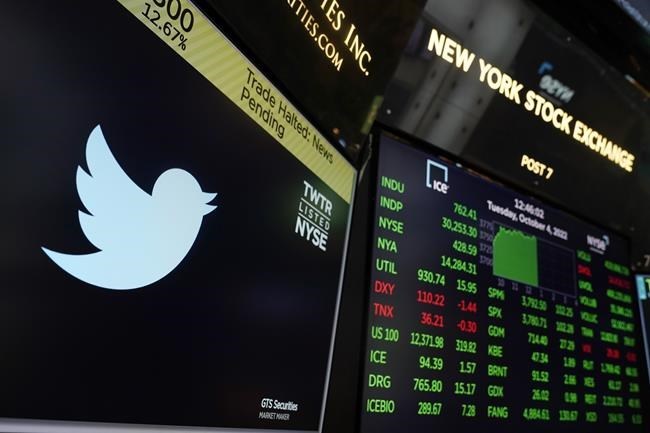TORONTO — Thousands of Twitter users are in search of new places to congregate and share thoughts online after Elon Musk's purchase of the social network last month.
While the Tesla and SpaceX leader mused about charging for verification and laid off hundreds of Twitter workers last week, people started flocking to these alternate platforms.
Mastodon
Mastodon has been one of the biggest winners of the surge away from Twitter. German programmer Eugen Rochko, who launched the platform in 2016, posted Monday that Mastodon hit 1,028,362 monthly active users.
The open-source, decentralized — not run by any one entity — social network is setup so users join servers, which are run by volunteer administrators and operate with their own rules. The platform has many of Twitter's features like hashtags and supports audio, video and photos, but rather than send tweets, users post "toots."
BlueSky
Twitter co-founder Jack Dorsey has been at work on BlueSky, an app that is decentralized and runs on blockchain — a system where transactions are recorded across several computers linked in a peer-to-peer network.
It's unclear how the platform looks and what features it has because it has yet to launch, but it already has a waiting list for its beta testing program.
Discord
This social platform has long been a hit with gamers, who use Discord to congregate in topic-based channels, where the company says they can share thoughts "and just talk about your day without clogging up a group chat." Discord users can create private or public channels to exchange voice or text messages.
The photocentric platform has been around since 2010 and only grown in popularity since Meta Inc. purchased it two years later. Instagram lets users post photos to their profile or curate them in a "story," which disappears after 24 hours. Users are also known to apply filters to their images, giving the photos more enhanced colours or adding animations like falling snow.
Reddit operates with a forum-like structure, where people can post to "subreddits," feeds organized around topics. There are standard subreddits for topics like Toronto or Canada, but more zany ones like Explain Like I'm Five, where people explain complex ideas in simple language. Most Reddit users don't reference their real names in their usernames, allowing them to shield their identities when posting.
Tumblr
Tumblr was started in 2007 as a microblogging site allowing users to share multimedia and text posts. Their posts are organized on blogs that they can make public or keep private.
The platform was purchased by Yahoo Inc. for US$1.1 billion in 2013, before Verizon acquired Yahoo! in 2017. Tumblr changed hands again in 2019, when Verizon sold it to Automattic, which operates the WordPress blog service.
The platform founded in 2003 is meant to be work-focused with users compiling their job and volunteer experience in resume-like pages. Users befriend one another by asking each other to “connect.” On the platform, they network, share work updates and promotions, access job postings, and share news stories.
TikTok
TikTok has grown immensely from its beginnings of popularized karaoke-style videos where people dance and lip sync. The social network's bite-sized clips are served up by an algorithm that appears to know what people want to see without having to search for it. It was founded by Beijing tech company ByteDance in 2016, but its August 2018 merger with similar social media platform Musical.ly catapulted it to success in North America. Donald Trump, a former U.S. president, once tried to ban the app, claiming its owner posed a security threat because it could be helping China spy on users.
This report by The Canadian Press was first published Nov. 7, 2022.
Tara Deschamps, The Canadian Press



